arte, 10.35 a.m.
On this voyage of discovery we visit a modern winery that is remarketing historic wines with a lot of commitment and public relations work. Traditional grape varieties, which were already drunk here in the times of the ancient Greeks and Romans, are to be made popular again. Thus, past and future are close together in Macedonia.
rbb Television, 12.15 p.m.
In Tarragona, Juliane Hipp visits the picturesque wine region El Priorat. Further north, on the Costa Garraf, the film author visits Sitges, a bustling holiday resort with many small shops, galleries and studios. Not far away is the wine-growing region of Penedès, also known for the production of the famous Catalan sparkling wine, cava.
3sat, 6.05 a.m.
The Moulin Rouge is probably the most famous revue theatre in the world. Founded in 1889, it was initially regarded as a frivolous and indecent den of iniquity where the Parisian bohemians met. Today, it is a highly structured company: 400 employees prepare the daily entertainment programme, 1700 guests come every evening, and the theatre is considered the largest consumer of champagne in France. Shoes are made, the spring wheels and costumes are sewn in the theatre's own workshops. The height and weight of the dancers are prescribed - this is the only way to dance the perfect can-can that made the Moulin Rouge world famous.
SWR Television, 5.25 a.m.
The Naheweinstrasse was launched in 1971. It had role models: the German Wine Route, which had already been founded in the Third Reich, and the Baden Wine Route, which was established in 1954. They were and are all projects to promote viticulture and tourism. In contrast to the German Wine Route, the Nahe Wine Route did not really catch on. After euphoric beginnings, the project fizzled out. But the Nahe region is becoming increasingly well-known among wine lovers, and the reputation of the Nahe wines is excellent. Viticulture benefits from a mild climate and extremely diverse soils. The landscape offers spectacular panoramas. Spa towns such as Bad Kreuznach and Bad Sobernheim have long attracted recreation-seekers to the area, who explore the charming landscapes of the Naheland from the healing springs. Along the 130 kilometres of the Nahe Wine Route, the SWR television team meets unusual people who are connected to this charming region in different ways. It visits traditional wineries that are facing up to the challenges of the present and delves deep into the region's Prussian past. It meets a contemporary witness from the founding days of the Nahe Wine Route, a newcomer with whom it strolls through Bad Kreuznach and shows the light and shade of the Nahe metropolis. The basic idea behind the Naheweinstrasse may no longer be current - but it is worth following its course. The Nahe region has surprising things to offer for those who like to explore!
Bavarian Television, 11.55 a.m.
Montepulciano is situated on a hill surrounded by vineyards. One of the most magnificent of the many Renaissance buildings is the Palazzo Ricci. Here, the Cologne Academy of Music runs the European Academy for Music and the Performing Arts. Tamina Kallert gets a guided tour with music and visits the historic wine cellar.
hr-television, 12.30 p.m.
hr-television, 8.15 p.m.
Wine and good food, picturesque villages and old castles, romance and conviviality - Stefan Pinnow finds all this in the Rheingau. Together with winemaker Theresa Breuer, he travels along the Rhine for six days, from the tourist magnet Rüdesheim to the casino city of Wiesbaden. They test the historic wooden bowling alley at the Schloss Vollrads winery and introduce the Rhine island Rettbergsaue. In the 900-year-old Eberbach Monastery, they let you show them where "The Name of the Rose" was filmed.
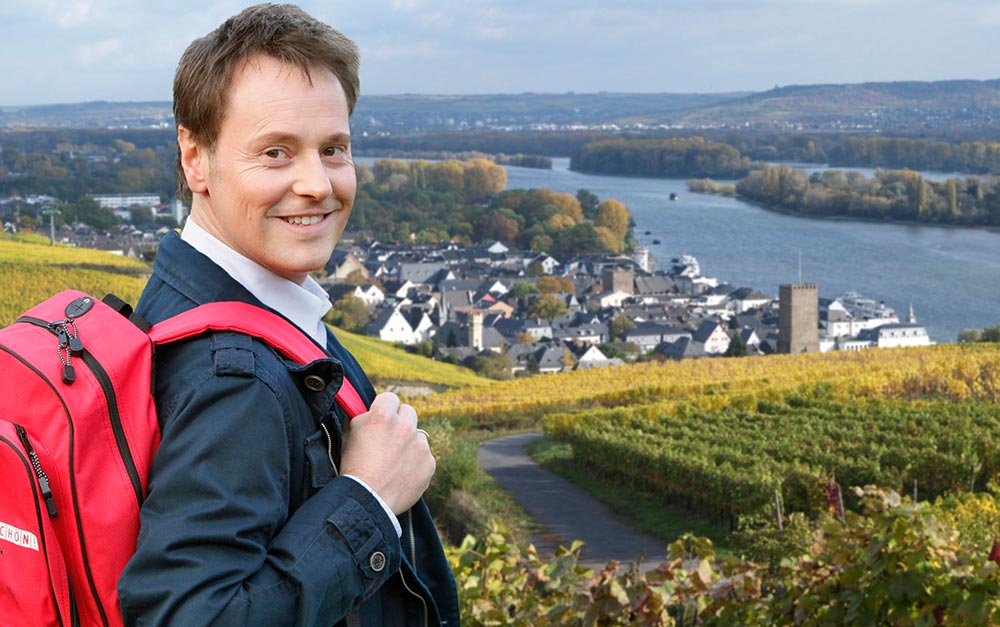 |
hr-television, 9.45 p.m.
To this day, people associate the Rhine with proud knight's castles, steep vineyards, cheerful conviviality and picturesque towns.
3sat, 1.30 p.m.
The Free State of Saxony in south-eastern Germany is a region with beautiful landscapes and great art treasures. Meissen is home to the world-famous porcelain manufactory, and the Lößnitz is the northernmost wine-growing region in Germany.
arte, 19.40
This three-part series rediscovers the river that flows through a world-famous wine-growing region. The films combine stunning landscape shots shot on water, on land and in the air with vividly told river stories that are as historical as they are modern and sometimes even startling and surprising.
SWR Television, 3.15 p.m.
Director Ulrike Becker and her team spent three weeks on the Aeolian Islands north of Sicily and sketched a portrait of the Aeolian soul in many small encounters. On Salina she meets the passionate winemaker Nino Caravaglio, who produces Malvasia wine. "This vine has determined the destiny of our islands," says Caravaglio, "it made Salina so prosperous that in the 19th century we had a fleet of about a hundred merchant ships. When phylloxera came at the end of the 19th century and completely destroyed the vineyards, it triggered a mass exodus. People had to emigrate, otherwise they would have starved to death. Only when means were found to control the aphid did second or third generation emigrants come back and replant the destroyed areas."
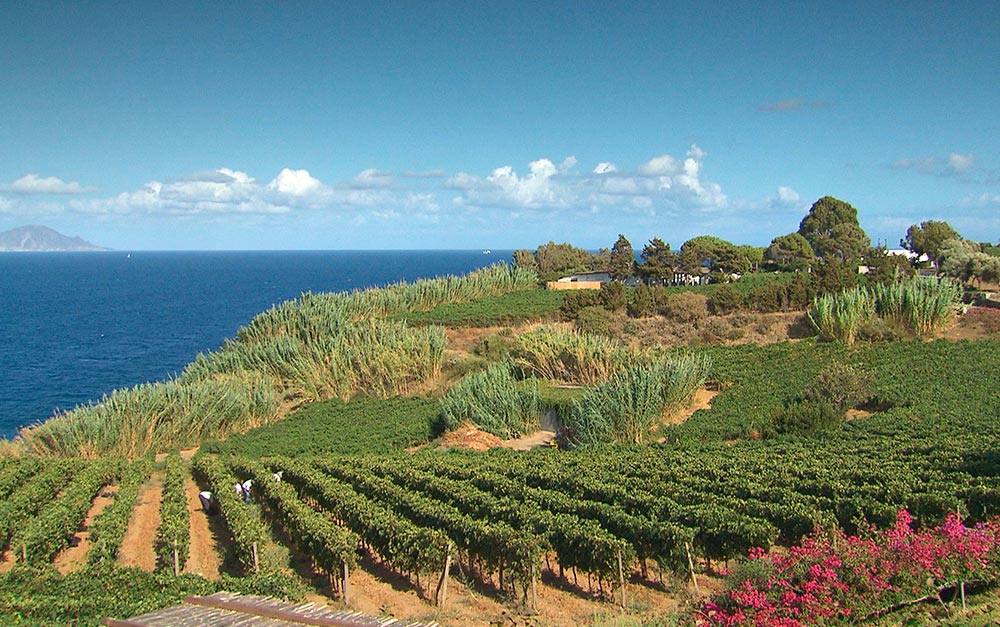 |
arte, 7.40 p.m.
The Luxembourg Moselle is just 39 river kilometres long between the two border towns of Wasserbillig and Schengen. The Moselle is densely populated here, yet in many places it is a natural paradise with vineyards as far as the eye can see. This is where Henri Ruppert, the eighth generation of winemakers, lives in his vineyard, where he grows Riesling, Pinot Gris and Pinot Blanc. With a lot of manual labour and almost no fertilisation.
hr-television, 9.00 p.m.
Nowhere in Germany does spring begin sooner than on the Hessian Bergstrasse. With 1,500 hours of sunshine a year, the region between Darmstadt and Heidelberg is rightly called the "Hessian Tuscany". Almond, fig and even olive trees thrive in the lush fruit orchards. On the 440 hectares of vineyards, the smallest wine-growing area in Germany, grapes for Kerner, Silvaner and Pinot Gris are harvested in autumn, but meanwhile historic grape varieties such as Zinfandel, St. Laurent or Roter Riesling are cultivated again. Young winemaker Caroline Guthier, Wine Queen of the Hessian Bergstrasse 2014, will be advised by the only expert on old wine varieties in Germany, Andreas Jung, and informed about characteristics and special features.
arte, 5.10 p.m.
A wide hilly landscape, scattered groups of trees and vines stretching to the horizon: this is what characterises the Bordelais region in western France. The area around the municipality of Saint-Emilion is a UNESCO World Heritage Site. 70 percent of the area is covered by vines - mostly of the Merlot variety. In the midst of the vineyards, magnificent manor houses and more than 200 castles stand alongside countless wineries.
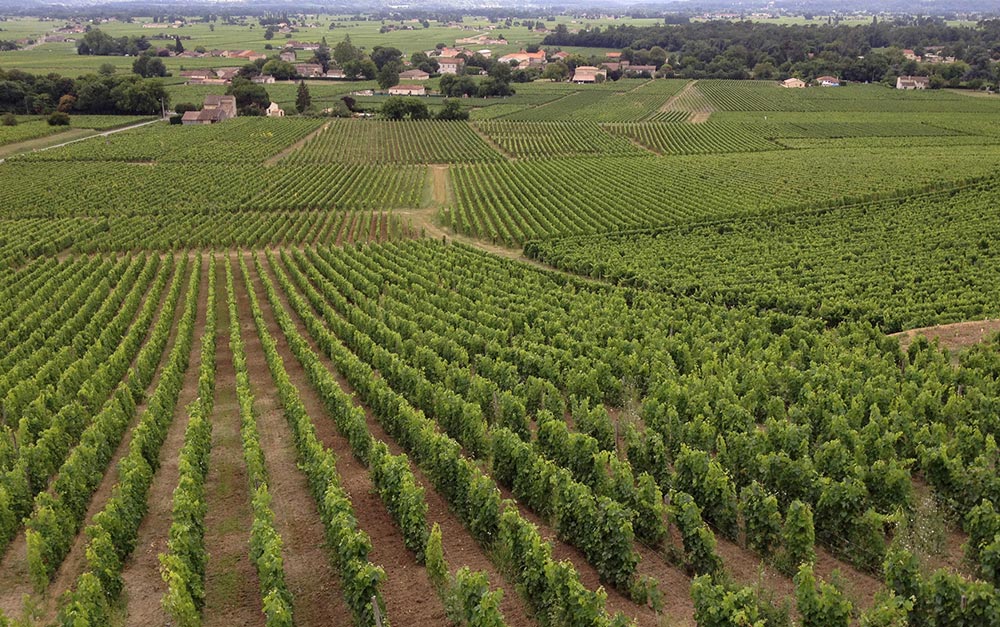 |
arte, 19.40
In Germany, the Moselle is associated with one thing above all: wine. For years, the reputation of Moselle wine was very poor, but now some local winegrowers are among the best in their field. For example, the 26-year-old Kilian Franzen and his partner Angelina Lenz. For their noblest wines, they have to climb the steepest vineyard in Europe. Slopes of up to 65 degrees make working in the Calmont a truly alpine challenge.
3sat, 11.45 a.m.
The different levels of the Danube are not equally popular everywhere: Although the river is loved as a leisure and nature lover, it is only the levels it leaves on houses and cottages when it leaves its bed unchecked that arouse - understandable - displeasure. Fortunately, there are winegrowing families like the Ubl-Doscheks who cultivate and thus fortify the wine on the slopes from the Vienna Woods to the Danube.
Bavarian Television, 7.30 p.m.
At the Altmain Festival in Sand, wine lovers from near and far taste the vintners' best drops in an exuberant atmosphere.
SWR Television, 11.15 a.m.
Nowhere is South Tyrol, Italy's northernmost province, more Mediterranean than around Lake Kaltern. It is one of the warmest bathing lakes in the Alps and surrounded by a large wine-growing area. Wine has made the area prosperous. The film also takes us to the village of Tramin on the Wine Road, namesake of the white grape variety Gewürztraminer. The village causes a sensation with the contemporary architecture of its cellar cooperative and with one of the most original carnival parades in the Alpine region.
arte, 19.40
Saint-Emilion still maintains the tradition of the Jurade, a relic from the time when the world-famous wine town still belonged to the Kingdom of England. The Jurade Saint-Emilion winegrowers' brotherhood celebrates the start of the grape harvest and welcomes numerous guests to celebrate the new harvest. The programme is also available online from 10/08 to 09/09 on ARTE's internet portal.
NDR Television, 8.00 a.m.
Visitors can expect a fascinating volcanic landscape with fertile soils used by winegrowers, bizarre rock formations and dreamlike beaches.
hr-television, 12.45 p.m.
Thomas' wine cellar is in the final stages of construction. This means that his future as a winegrower is taking on a very concrete shape.
ANIXE, 13.20
Following in the footsteps of the first settlers in the Barossa Valley, we come across one of the best South Australian wines. The climate and the location right up to the ocean give the red wines their special flavour.
Bavarian Television, 2.05 p.m.
Agriculture took off under the Habsburgs. The border region of Trentino required a constant presence of soldiers. They received a monthly ration of wine by decree from Vienna, and for the originally poor farmers this became the most important source of income. And wherever the eye looks today, the trail always leads to wine. Travellers are more familiar with the nearby South Tyrol or only the southern part of Trentino - Lake Garda - but there is much more to discover in Trentino, especially for wine and nature lovers.
SWR Television (RP), 6.05 p.m.
The municipality of Sulzheim is located in Germany's largest wine-growing region: Rheinhessen. Since 1967, there has also been a close partnership with the French Canton de Sainte-Suzanne.
3sat, 19.40
The Amalfi Coast is wildly rugged and offers hardly any space for a large settlement. Steep cliffs, narrow bays, terraces with wine and lemons - a landscape like something out of a picture book.
Bavarian Television, 8.15 p.m.
Topic number one in the Eisack Valley is, of course, wine and the most popular of all methods of tasting it, the traditional Törggelen with bacon, South Tyrolean doughnuts and many other ingredients. On the "Keschtnweg", after a visit to an old-established vintner, Sonja Weissensteiner explores the question of why the sweet chestnut has been rediscovered as a local delicacy.
3sat, 21.45
The soil there is fertile, wine, apples and pumpkins thrive.
ANIXE, 19.45
On his journey through Cyprus, Falk-Willy Wild can see for himself that the Cypriot wines are of outstanding quality. No wonder, because wine has been cultivated in Cyprus for thousands of years. An art that is also cultivated in the island's monasteries.
3sat, 5.00 p.m.
The German Wine Route runs for 85 kilometres from Bockenheim to the French border - to Schweigen-Rechtenbach in the Palatinate. It is a varied region. The region has been dominated by viticulture since Roman times. The remains of an almost 2,000-year-old vineyard near Bad Dürkheim are evidence of this history. Winemaker Markus Schneider is one who, despite all his love of his homeland, also breaks with tradition. He began his training as a winemaker at the age of 15. From then on, it was clear to him what he wanted: To make wine, according to his own rules.
ANIXE, 21.00
SWR Television, 2.30 p.m.
The Moselle is one of the most beautiful river landscapes in Germany. Coming from France, "La Moselle" winds its way past Trier to Koblenz. The one-kilometre-long Moselle slope viaduct of the Moselle main railway is one of the most impressive motifs of the Middle Moselle. Directly above it, steep vineyards are cultivated with the help of rack railways. Spectators watch the winegrowers at work and ride "roller coasters".
3sat, 2.00 p.m.
It is the vastness that captivates visitors to the Weinviertel. It is no coincidence that the Weinviertel bears its name - viticulture determines the landscape in all its cultural forms and has always been characteristic for the inhabitants of this region.
arte, 3.50 p.m.
The region around the small town of Arbois in the Département Jura is famous for its winegrowing. Here, Evelyne and Pascal press a 100 percent natural wine from organically grown grapes. The programme is also available online from 17/08 to 24/08 on ARTE's internet portal.
hr-television, 12.25 p.m.
It's autumn in Rust: school starts for Anna and Thomas' first grape harvest is coming up. Paul and Thomas find each other in the cellar of the Schnell winery, where Paul shows his father his wine treasures and opens a century-old wine to celebrate.
3sat, 2.30 p.m.
The northernmost wine route in Germany and Europe
arte, 1.10 p.m.
In the villages, the dialect is often still alive, for example in Seebach, one of the most beautiful half-timbered villages in Northern Alsace. There, the film team visits a German-French winemaker couple who produce organic wine and crémant; they say Alsatian rosé crémant is on the rise.
arte, 1.50 p.m.
South Alsace scores with the diversity of its landscape - from the vineyards on the Alsace Wine Route to the peaks of the Vosges Mountains and the lively city of Mulhouse. On the Alsace Wine Route, a pair of winegrowers have opted for sustainable architecture when building their farm and at the same time converted the operation to biodynamic cultivation.
SWR Television (RP), 6.05 p.m.
Waldrach is located in the Ruwer valley and belongs to the district of Trier-Saarburg. The people here seem to be successful in everything they do. Whether it's two winegrowers hoping for synergy effects through joint management and division of labour, an innkeeper or a decorator working with fabric and straw.
WDR Television, 8.15 p.m.
Andrea Grießmann explores the divided island in the eastern Mediterranean in a rental car.
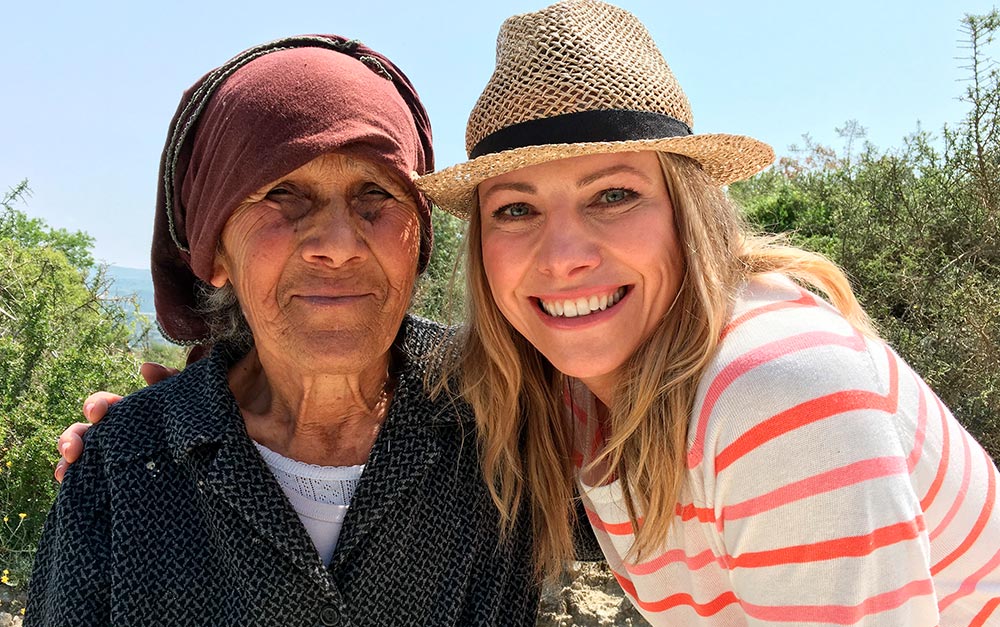 |
rbb television, 10.05 p.m.
At the vineyard of Schlieben, wine-growing boss Annette Engel and her "mature" youth brigade managed to revive the centuries-old tradition of wine-growing.
hr-television, 12.05 p.m.
Bastian Fiebig and Stefan Maxeiner, two colleagues from the Frankfurt Gourmet Academy, go on a trip to Chablis in the north of Burgundy. Fiebig and Maxeiner love the "savoir vivre" and make wonderful culinary discoveries. Of course, a visit to the vineyard is not to be missed. Bastian Fiebig is a gastro-journalist and regularly takes wines with him to taste at his wine tastings at the Frankfurt Genussakademie.
arte, 11.50 a.m.
Raphaël Hitier roams the Ribeira Sacra today: The Spanish wine-growing region is located in the north-western region of Galicia near the Portuguese border.
SWR Television, 3.15 p.m.
Chateau Carbonneau is one of about 3000 vineyards around Bordeaux. The owners, the winemaking couple Jacquie and Wilfrid Franc de Ferrière, rent out five guest rooms there. Those who stay with them are not only allowed to taste their wine, but also to help with the grape harvest. Wilfrid's wife Jacquie comes from New Zealand, and because she is fond of roses, she has planted almost two hundred rose bushes on the estate. She is helped in her work by a New Zealand intern, to whom Jacquie also gives an insight into the French way of life.
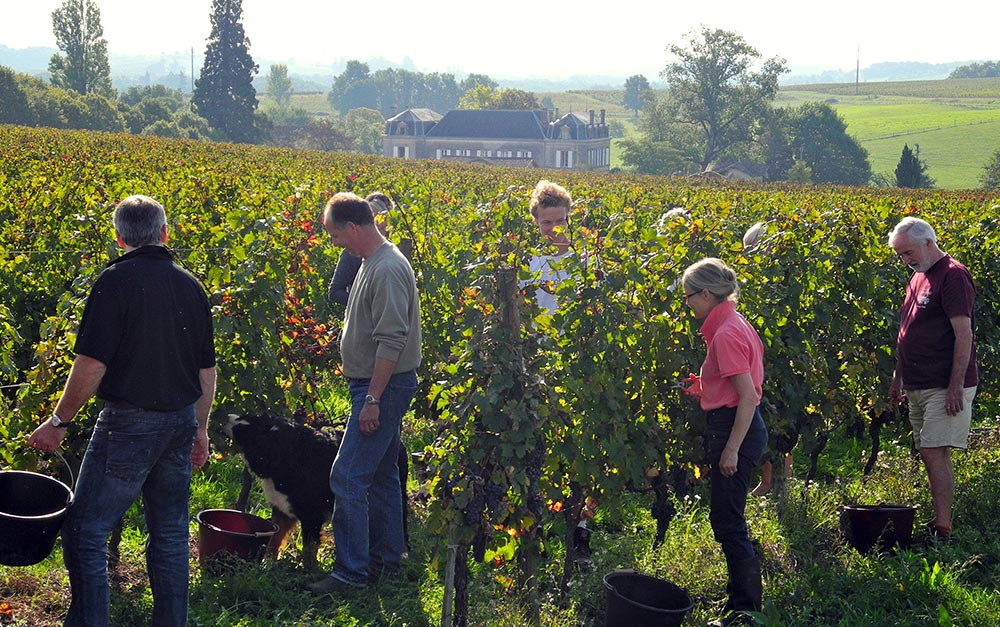 |
hr-television, 6.50 p.m.
On a trip to South Africa you simply cannot miss Cape Town - for many it is the most beautiful city in the world. In the east of Cape Town, world-renowned wines grow against a breathtaking backdrop, which is why a trip to the pretty farms of the Winelands is not only recommended to lovers of a fine wine.
ANIXE, 19.45
Anixe accompanies a language student on her journey to the southernmost region of Spain. Malaga is the second largest city in Andalusia after Seville. Malaga's most famous son and artist is Pablo Picasso, whose birthplace can be visited. In an old bodega, our language student tastes Picasso's beloved sweet wine. The language school takes us to a wine tasting of 16 different varieties, including sweet liqueur wine.
ANIXE, 21.00
Rothenburg ob der Tauber is one of the most beautiful and popular destinations for foreign tourists in Germany. Most guests from all over the world often only stay for a short sightseeing tour in the small town. In doing so, they miss out on one of the most beautiful regions in Germany - the Swabian Burgenland and the Tauber Valley. This is where we are now going on a journey for romantics and connoisseurs. The region, once the largest wine-growing area in Germany, offers many surprises for gourmets and explorers. First-class regional cuisine is accompanied by wines from the region and exquisitely brewed beer. Come with us on a journey of discovery with lots of "taste."
Bavarian Television, 11.55 a.m.
In the Valais alone there are more than 8,000 kilometres of hiking trails and over 40 four-thousand-metre peaks: less adventurous, but designed entirely for enjoyment, is the vineyard educational trail of Visperterminen - an invitation to all hikers who want to know more about winegrowing at lofty heights.
SR Television, 8.15 p.m.
The heavy rain events and floods in Saarland at the beginning of June have once again shown how helpless we are at the mercy of the forces of nature. And how dramatic the consequences would be if such events were to become even more frequent as a result of climate change, even with a temperature increase of two degrees. Annette Bak set out to find out what climate change in the future could mean for Saarland, together with those affected and experts. She points out the problems, but also presents solutions that can be used to counter climate change in a gentle way. Farmers are being troubled by weather extremes such as drought, heavy rain and heat, which are unprecedented in their scale. Because the time windows for harvesting are getting smaller and smaller, they need bigger machines to bring in the harvest faster. Only the regional winegrowers tend to be on the winning side. The milder climate gives them up to 20 degrees Öchsle more than thirty years ago.
Bavarian Television, 11.55 a.m.
Despite its proximity to the Alps, the microclimate on Lake Garda is Mediterranean, with warm summers and mild winters - ideal for growing olives, wine, lemons and palm trees. The Isola del Garda in the bay of Salò is privately owned and has only been accessible to foreigners for a few years. Tamina Kallert meets Alberta Cavazza, one of seven children of the widowed Princess Borghese-Cavazza. The Contessa lives on the island with her family, goes shopping by boat and, after a guided tour of the park and part of her villa, invites visitors to taste wine on her terrace.
arte, 7.20 a.m.
Mendoza is the most important wine-growing region in Argentina. The city is located on Ruta 40, the legendary national road that runs along the imposing mountain massif of the Andes and crosses the country from north to south. Since July 2005, Mendoza has belonged to the so-called Great Wine Capitals, internationally renowned wine-growing regions. In Mendoza, the red grapes of the old French grape variety Malbec are cultivated. More than 1,200 wineries in the region produce 70 percent of Argentina's wine. Wine has been grown here since the 16th century. The film team around David Yetman climbs up the vineyards, does one or two wine tastings in a bodega and enjoys the Argentinean cuisine. The journey then continues south to the northern border of Patagonia. A harsh wind sweeps across the barren steppe landscapes there, fringed by the breathtaking Andes massif and impressive volcanoes. The programme is also available online from 25/08 to 02/09 on the ARTE internet portal.
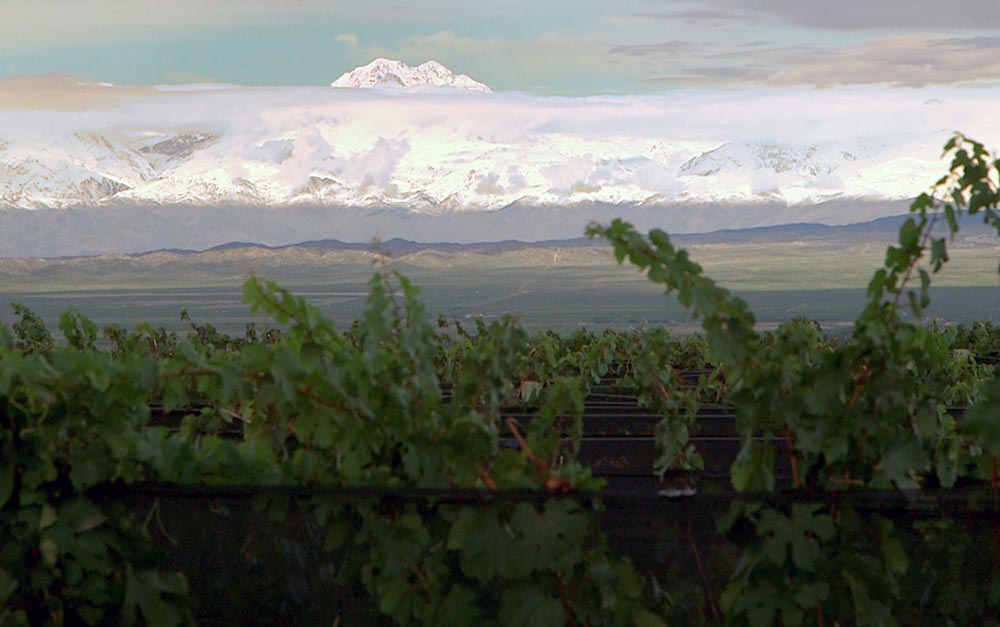 |
hr-television, 12.30 p.m.
Thomas Stickler left his Burgenland hometown of Rust at an early age and made a career abroad. For years he has been working as a production director in a Frankfurt high-tech company. When it is decided at a meeting to outsource the company's production facilities to Hungary, he clashes with the management and quits his job.
arte, 13.45
The area around the small town of Arbois in the Département Jura is known for its winegrowing. Here, Evelyne and Pascal press a 100 percent natural wine from organically grown grapes.
3sat, 3 .00 p.m.
Galicia is more unspoilt than almost any other part of Spain. The region, which offers many culinary treasures, is located in the north-western corner of the country. Lojze Wieser explores the rustic cuisine of Galicia and tastes the fine wines that have tantalised the palates of many pilgrims on the Way of St James since 1100.
3sat, 4.00
At 36 kilometres, the Wachau is only a short section of the 2800-kilometre-long Danube - and it is a UNESCO World Heritage Site. The winding Danube valley, the riparian forests, rock formations and man-made vineyard terraces are UNESCO natural monuments. The Wachau is also known for its idyllic villages, its monasteries and castles. The Wachau has been wine country since Roman times - today the "Land am Strome" with its white wines can compete with any wine-growing region in the world.
3sat, 15.05
In Transylvania, summer is coming to an end - the Saxons are harvesting the sweet grapes they have cultivated on the small vineyards. The grape harvest is the highlight of the harvest year.
SWR Television, 3.15 p.m.
For centuries, the vineyard peach grew along the Moselle in good proximity to the vines and shaped the landscape. But since the 1970s, more and more winegrowers have given up: Viticulture in the difficult-to-grow steep slopes no longer paid off. And with the vines, the "Pesch" also disappeared. Slowly, the fruit is returning to the kitchen table. Markus and Meta Dreis from the Moselle village of Bremm have about 400 peach trees. Jörg Wolf, one of the few table grape growers in Rhineland-Palatinate, grows wine on a good 14 hectares. But his passion is not for wine grapes, but for table grapes. At first glance, he seems rather inconspicuous, small and hard, round and with a furry skin. But when cut open, it looks spectacular with its purple-coloured flesh. This is what gave it its name: red vineyard peach. For centuries, it grew along the Moselle in close proximity to the vines and shaped the landscape. But since the 1970s, more and more winegrowers have given up: Viticulture in the difficult steep slopes of the Moselle no longer paid off. And with the vines disappeared the "Pesch", as the Mosel people call the red vineyard peach. But slowly the fruit is returning to the kitchen table. Markus and Meta Dreis from the Moselle village of Bremm have about 400 peach trees. He takes care of the trees, she takes care of processing and marketing the fruit - as a sideline, a hobby, so to speak. "The hobby has become quite time-consuming, but it is a lot of fun and a great balance to my actual job as a media designer," says the man in his mid-forties and laughs. The red vineyard peach was then joined by a little Riesling. And that in the steepest steep slope in the world, the Calmont. The vineyards of Jörg Wolf from Ungstein in the Palatinate are not quite as steep. The trained vintner grows wine on a good 14 hectares. But his passion is not for wine grapes, but for table grapes. He cultivates them on about two hectares. Jörg Wolf is one of the few table grape growers in Rhineland-Palatinate and is one of Germany's pioneers in this field. He has about 15 varieties in his stock and also sells his vines to Serbia or France. Some varieties are already ripe at the end of August, but the actual harvest time begins in September. "We harvest everything by hand here, nothing can be done mechanically with the table grapes," says Jörg Wolf. He and his wife Regina sell an average of 500 kilos of table grapes per week in direct sales during harvest time. "Unlike imported grapes, our table grapes do not have long journeys behind them. They come directly from the plantation. And people really appreciate that," enthuses Jörg Wolf.
ZDF, 5.35 p.m.
Up to 75 percent of Germany's insects have already disappeared. A silent death, with serious consequences. Two thirds of the hundred most important crops need pollination by insects. New habitats and food supplies are needed: in cities, in the countryside and in private gardens. "plan b" presents ideas to make this happen. The recipe for survival for bees, butterflies and hoverflies: more native wild plants for public and private gardens, flowers for cornfields and less pesticides. In France, the DEPHY network, an association of 3000 conventionally managed farms, is trying to minimise the use of pesticides. Among other things, the farmers plant a wider range of crops, work with crop rotations and control weeds mechanically. They are advised by biologists and agro-scientists like Florent Banctel. He helps winegrowers in the Loire region to use less poison. The successes are remarkable: on 59 percent of the farms, the use of pesticides could be reduced by 42 percent without any reduction in yield. On average, the use of pesticides was reduced by 30 percent.
Bavarian Television, 4.45 p.m.
A small but important part of the "Baranja County" for Croatia, which borders on Serbia and Hungary and lies between the Danube and the Drava, stretches from the Kopački Rit National Park to the famous wine-growing area of Zlatna Brda. Baranja has always been the destination of many conquerors.
3sat, 1.35 pm on the road - Croatia
Croatia has experienced a real boom in recent years: secluded bays and vineyards are partly responsible for this.
3sat, 11.40 a.m.
Galicia is more unspoilt than almost any other part of Spain. The region, which offers many culinary treasures, is located in the north-western corner of the country. Lojze Wieser explores the rustic cuisine of Galicia and tastes the fine wines that have tasted the palates of many pilgrims on the Way of St. James since 1100. 80 types of seafood, a variety of vegetables and fruits, small livestock, pigs, cattle, cheese, wine and their own brandy - these are the ingredients for the dishes of the people who tell their story between the mountains and the sea.
SWR Television, 6.15 p.m.
It has long been impossible to imagine the grape harvest without them: the massive harvesters that push their way through the vineyards and shake the grapes off the vines in the blink of an eye. One machine replaces around 100 harvesters and, in times of climate change, enables a gentle and fast harvest in the cooler morning and evening hours. The only German manufacturer of grape harvesters, the company ERO Gerätebau, is not - as one might expect - at home in a wine-growing region, but in the beer-drinking Hunsrück. From the small village of Niederkumbd, the red giants have so far gone to the entire wine-growing world - from Europe to New Zealand. The success of their products has long since brought the company to its limits; it can no longer grow in Niederkumbd. That's why ERO boss Michael Erbach had to make a tough decision a few years ago: the company is rebuilding and moving completely to Simmern, seven kilometres away. A huge financial and logistical challenge for the medium-sized family business, because even during the new building and racking production must continue to run at full capacity. Will that work? "made in Südwest" has accompanied the process for three years.
arte, 5.10 p.m.
Madeira, which means "wood" in Portuguese, is an archipelago in the Atlantic Ocean. The main island with its volcanic mountains rose from the depths of the ocean several million years ago. People have created tiny terraces here that are irrigated by small canals. They stretch across the entire island and ensure an even distribution of rainfall. Mangoes and avocados were grown on the terraces, and some time ago viticulture was added. The programme is also available online from 30/08 to 06/09 on the ARTE internet portal.
Bavarian Television, 7.30 p.m.
The dishes in this episode include: roast saddle of veal on asparagus risotto, venison shoat with gingerbread sauce, roast saddle of venison with a wine berry glaze and herb sautéed mushrooms This time the journey goes along the Main River from Franconian wine country near Prichsenstadt via a detour to Wertheim in Württemberg's Tauber Franconia to the historic Main quadrangle near Miltenberg. Culture and landscape are characterised by winegrowing, castles and half-timbered houses. The cuisine offers regional delicacies such as venison shoofly and crusted roast. The Tauber flows into the Main at Wertheim. Steep vineyards and imposing castle ruins line its path.
hr-television, 9.00 p.m.
Juliane Hipp travels to Tarragona's hinterland, to the wine region El Priorat and to Sitges, a bustling holiday resort with many small shops, boutiques, galleries and studios. Not far away is the wine-growing region of Penedès, known for its famous Catalan sparkling wine Cavas.
NDR Television, 10.00 p.m.
Julia Klöckner has been the new Federal Minister of Food and Agriculture in the Merkel cabinet since March 2018. Born in Rhineland-Palatinate, she became a member of the CDU in her mid-20s. The former German Wine Queen tells "3nach9" about the challenges her new job has presented her with so far and whether a good wine harvest can be expected in 2018.